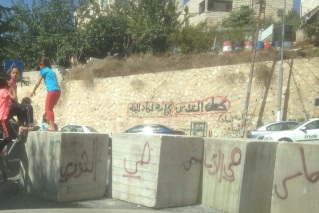 Abu-Tur-roadblock-by-Khader-Daibes
Abu-Tur-roadblock-by-Khader-DaibesThe decision of political authorities last week, which led to the deployment of dozens of roadblocks and inspection checkpoints around East Jerusalem, amounts to the unlawful, collective punishment of 350,000 male and female residents of East Jerusalem, who comprise approximately 40% of the city’s population.
One week has passed and the heavy burden on residents is continuing. A few roadblocks have been removed, but others remain in place and continue to prevent vehicles from passing major intersections. Checkpoints are still carrying out inspections. This has resulted in huge traffic jams; disruptions to public transportation, with travel times extended by at least one hour; and delayed arrival times of emergency vehicles. In several neighbourhoods, people have had to walk to the roadblocks and then board buses waiting on the other side. In Issawiya, thousands of students who attend schools outside their neighborhood are forced to make their own way to the checkpoints and then wait to be individually checked. Roadblocks are seriously disrupting access to hospitals, for both patients and staff.
Extensive delays, questioning and searches conducted at checkpoints without reasonable suspicion by police, are unacceptable and degrading acts that treat residents of East Jerusalem as suspects of terrorism. These collective actions, enforced without individual consideration or suspicion, cause lasting harm to human rights, including the freedom of movement, dignity and right to privacy.
The suspicion that the closure is intended to impose collective pressure on residents was strengthened by the comments of Yizhar Peled, commander of the Border Police in Jerusalem. Peled referred to the roadblocks when he said, “those pressure levers are activated to stop the attacks … so that residents will condemn and oppose these acts”(Saturday supplement of ‘Yediot Achronot’ 16/10/15). Placing roadblocks in order to exert pressure on the public amounts to prohibited collective punishment and is therefore illegitimate and illegal.
The police have a responsibility to protect human life, and they are given wide powers in order to do so. These powers are based on fundamental principles designed to safeguard human rights. Violations of these rights are permitted only in a proportionate manner, on the basis of specific and concrete evidence.
The law permits police to place temporary barriers following a specific event or danger. However the police have no authority to surround entire neighbourhoods indefinitely; and certainly not with the intention of activating pressure or punishing residents collectively. Even the powers that police have to detain a person, require someone to display their identification and perform searches are limited to cases where a specific person is suspected of an actual, concrete offence.
For more information please contact:
Yaron Kelner
Spokesperson, The Association for Civil Rights in Israel
052-341-0631







